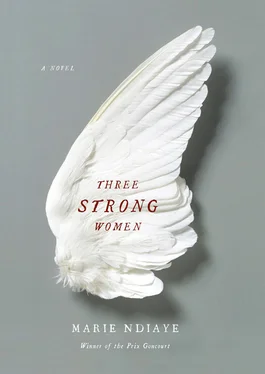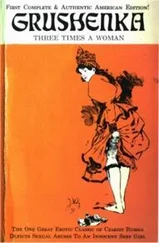She would ask him in a low voice why he was three quarters of an hour late and perhaps, too, why he didn’t simply forbid Mummy to set foot in Manille’s workplace.
So he contrived to mumble some answer that didn’t require him to look her in the eye.
In the dazzling glare of the room the vivid pink of Cathie’s blouse shone brightly around her.
Rudy could see it reflected in the white surface of his own desk.
He knew too that if he turned toward Cathie he’d clearly see past her small, pale face to the other side of the picture window looking out over Manille’s villa, a big building with blue shutters, pale pink roughcast walls, and a roof of Provençal tiles, separated from the commercial premises by a simple lawn, and he couldn’t help wondering, for the n th time, painfully and fruitlessly, whether Cathie and the others, Dominique, Fabrice, and Nathalie, had watched Fanta’s comings and goings at the boss’s dream house, noticed how many times she’d entered, and why he, Rudy, had never seen her there, even though, during that terrible period when he “knew” without “really knowing” (no need to believe everything Mummy said, after all), he’d never ceased glancing at the picture window, past Cathie, who felt sorry for him and showed sympathy (so was everybody privy to his troubles?), at the villa’s fussy double doors with their wrought-iron fittings.
How he’d suffered then!
How ashamed, how furious he’d felt!
All that was now long past, but he still couldn’t speak to Cathie without feelings of rage boiling up in him as he glanced at Manille’s house.
He suddenly felt like saying to her in a dry tone that would make her uncomfortable, “But that’s pretty well the only consolation Mummy’s got left in life, distributing left and right her bundles of pathetic leaflets in support of poor cretins as lonely and idle as she is, how do you expect me to tell her to stop coming here and, really, who’s bothered by it, eh?”
But he said nothing.
He remained conscious of the aura of fuchsia that surrounded her and it annoyed him, because he couldn’t forget her presence.
He pushed to one side the packet of leaflets held together with a rubber band.
“They are in our midst.”
The clumsy, almost laughable picture of an adult angel sitting down at a table with members of an ecstatic family, and the angel’s silly smirk.
“They are in our midst.”
Such inanities that kept Mummy from drowning in melancholy and antidepressants were, literally, her salvation.
He was outraged that a Little Miss Nobody like Cathie, in the guise of trying to be helpful, would dare to suggest that he deprive Mummy of the pleasure of bringing her brochures to Manille’s place.
What did she know about Mummy’s sad life?
“Hey, tell me, does Manille want my mother to stop coming here?” he asked suddenly.
He looked at Cathie, dazzled by the absurd intensity of her pink blouse. It was such an effort keeping his eyes fixed upon her face, to resist their tendency to wander, that his head started aching violently.
Meanwhile he felt as if a hot poker was being pushed up his anus.
“Not at all,” said Cathie, “I’m not even aware if he noticed your mother coming in.”
She smiled, surprised he could think such a thing.
Oh no, he thought, downcast, it’s starting again.
He raised his buttocks feebly from the chair and balanced on the edge of the seat so that only the top of his thighs remained in contact with it.
But the mild relief he’d hoped for failed to materialize.
He then heard, through the fog of pain that had suddenly enveloped him, Cathie’s muffled voice.
“It’s not like Manille to stop your mother coming, is it?”
Rudy couldn’t now remember what he’d said or what he’d asked.
Ah, Mummy. It wasn’t like Manille to show the slightest harshness, or to try to shoo away this ridiculous woman who really believed she could, by means of tracts written and printed in her living room — tracts that swallowed up a not inconsiderable part of her meager pension — convince kitchen salesmen of the presence of angels all around them.
At the very most he’d …
That familiar itch, which had taken him by surprise, he was beginning to subdue in his mind.
He brought to bear all the old defense mechanisms (those he’d not used in quite a while, because for several months he’d been left in peace by the problem), the most immediate of which consisted in directing his thoughts toward topics having no connection with his own body, or with any other body, real or otherwise, so that, quite naturally, he started thinking intensely about Mummy’s angels, and he reached out with his fingers to bring the packet of brochures nearer to him.
How would Mummy answer the question of whether angels ever suffered from piles?
Wouldn’t she be happy and flattered to see him asking, with apparent seriousness, to hear him broaching …
Stop, stop, he said to himself, in a panic. That wasn’t at all what he ought to be concentrating on.
The pain came back, more insistent, exasperating.
He had a terrible longing to scratch, no, to scrape off, to tear away, this goading, burning flesh.
He rubbed against the edge of the chair.
With a trembling finger he started up his computer.
Then he looked again at the picture of the angel, the clumsily drawn figure, the naive decor sketched by Mummy, and suddenly he discerned beyond all possibility of error what his eyes had been content to skim over without any attempt at interpretation a few moments earlier.
As he’d vaguely felt already, the three members of the small family seated at the table looked like Djibril, Fanta, and Rudy, and only the artist’s lack of skill shielded them somewhat from the risk of being recognized, but more than that someone had afterward attached to the angel a vigorous penis that was clearly visible under the table and seemed to emerge from a specially fitted pocket in the long white robe.
Rudy flicked through the packet of fliers.
The angel had only been mocked on the first one.
He turned the packet over and pushed it toward a corner of his desk.
He glanced at Cathie.
At the same moment she raised her eyes and frowned anxiously.
“Anything wrong, Rudy?”
He grinned sardonically.
Oh, how it hurt, and how angry he felt that it hurt.
“Who put the brochures on my desk?” he asked.
“I told you, your mother came in this morning.”
“So she herself put them there, in person?”
Cathie shrugged uncomprehendingly, slightly annoyed, and said, “I don’t see who else it could have been.”
“But you didn’t see her?”
Cathie was smiling now, but coldly, conspicuously restraining her feelings of impatience.
“Listen, Rudy, I do know that your mother came in with her … brochures, or whatever. I saw her in the lobby, but it so happens that I wasn’t at my desk when she dropped them off.”
He leaped off his chair, suddenly intoxicated with rage and pain.
But a small sad voice whispered inside him, “How can you hope to be good when you suffer the torments of the damned?” It was the voice of the calm, cheerful, seductive Rudy Descas that Rudy wanted so badly to be again, with the pitiless moral standards he set himself and the less stringent ones he applied to others.
And it was with terror and dread that he noticed Cathie flinch slightly as he approached her chair.
He felt the others around him watching him silently.
Had he become the sort of man feared by women and despised by other men, especially strong men capable of self-restraint, like Manille?
He suddenly felt terribly unhappy, craven, useless.
Читать дальше












